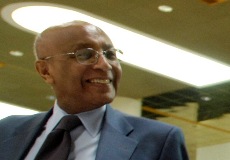Darfur peace talks could move from Libya – mediator
November 14, 2007 (KHARTOUM) – While the African Union envoy on Wednesday conceded that he was prepared to conduct part of the Darfur peace talks outside Libya, the chief mediator said clearly that talks will not be scarified for the venue.
 The concession could remove a significant stumbling block for some Darfur insurgents who have so far refused to attend the negotiations, saying Libya is politically too close to their opponents in the Sudanese government.
The concession could remove a significant stumbling block for some Darfur insurgents who have so far refused to attend the negotiations, saying Libya is politically too close to their opponents in the Sudanese government.
Salim Ahmed Salim told reporters that while negotiations would conclude as planned, in the Libyan town of Sirte, “specific areas could be discussed in one place or another”.
“The most important thing is not where we go. The most important thing is whether they are prepared now to engage in negotiations,” he said.
When asked to clarify the position, the chief U.N. negotiator for the talks, Taye-Brook Zerihoun, told Reuters: “If it comes to it that all sides are against the venue, then we are not going to sacrifice the talks for the venue.”
Official have in the past refused to consider another venue.
The peace talks, brokered by the AU and the United Nations, fell into disarray late October when most significant rebel groups refused to attend, saying they needed more time to prepare their positions.
Many also took offence at comments from Libyan leader Muammar Gaddafi, the host of the talks, that the Darfur conflict was a fight over a camel.
A rebel umbrella group, which says it represents reunited splinter factions in the rebel Sudan Liberation Army, this week demanded the talks be moved to Switzerland.
While the Libyan negotiations foundered, representatives of most of the major groups have been meeting in south Sudan’s capital Juba to try to reach a common position. Eight of the smaller factions announced on Tuesday they were now ready to unite under one banner.
Salim’s U.N. counterpart Jan Eliasson, speaking to journalists with Salim on Wednesday, said he was now stepping up efforts to encourage some of the larger rebel forces to find common ground and attend the second round of negotiations with Sudan’s government in December.
Eliasson defended the progress of the peace talks so far. “We would have wanted to start in greater glory with a lot more people present.
“But I would say that the discussions that now go on with such intensity in Juba, in Darfur and elsewhere are because we now have at least the beginning of the process.”
Eliasson and Salim spoke after flying into Khartoum from the Eritrean capital Asmara. They said they had held consultations with representatives of governments neighbouring Sudan including Eritrea’s president Isaias Afwerki.
(Reuters)
